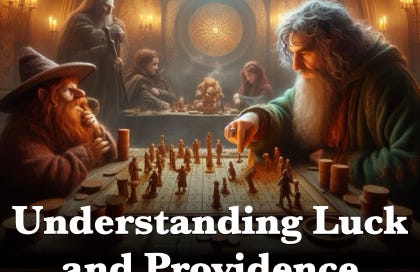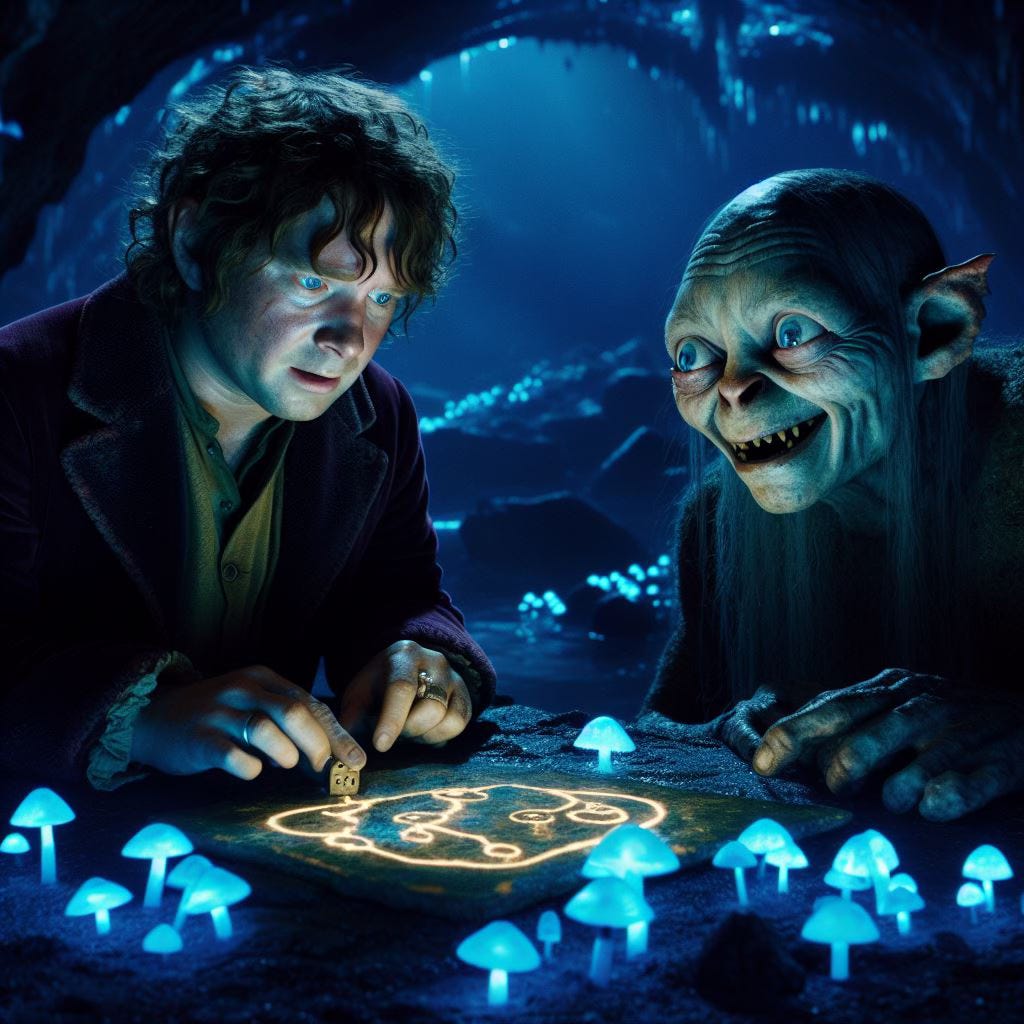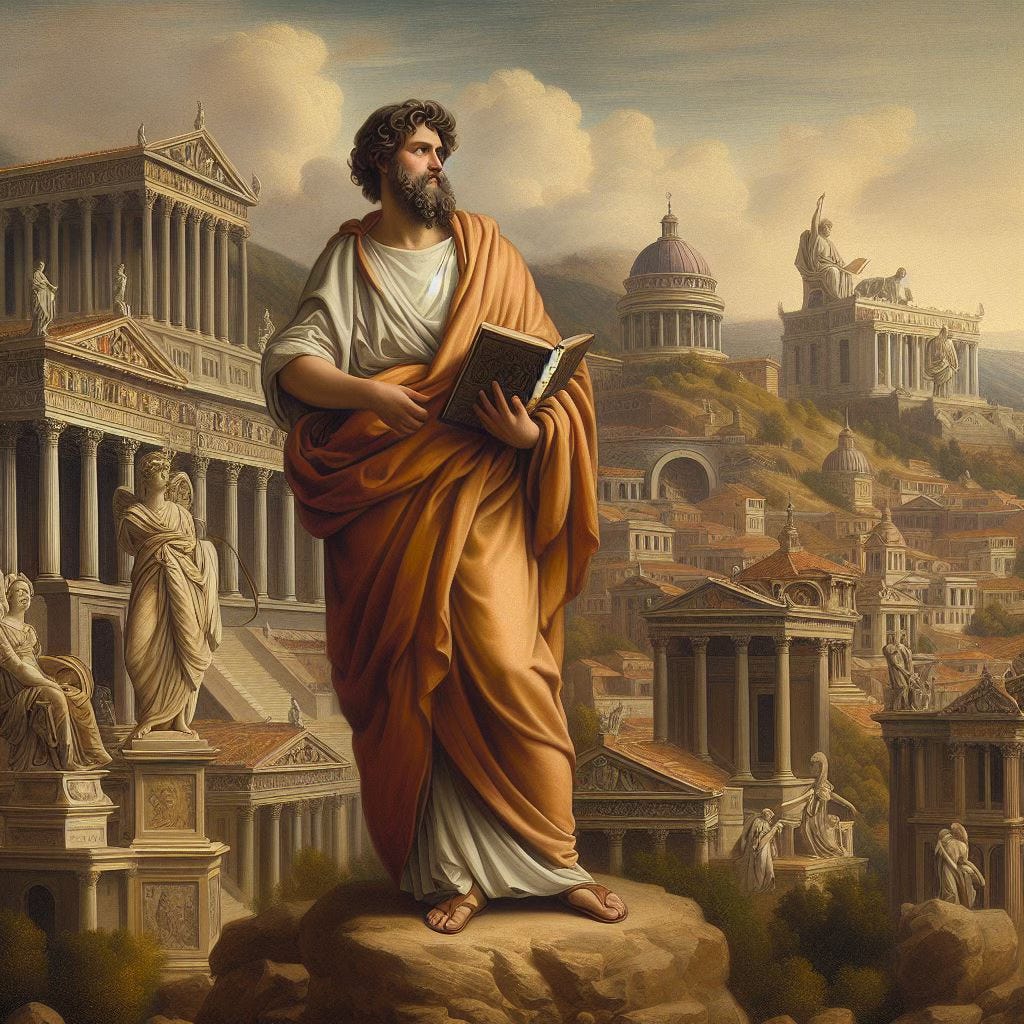Hello Friends,
When we think of the word “luck”, we often consider it synonymous with the word “chance”, or perhaps “mere chance”. Luck seems to be something that is entirely random. In modern literature, we can point to Obi-Wan Kenobi’s quote: “In my experience, there’s no such thing as luck.” We could also look to Tolkien’s The Hobbit, where Gandalf proclaims: “You don’t really suppose, do you, that all your adventures and escapes were managed by mere luck, just for your sole benefit?”
Like many ancient topics, we have to dive a bit deeper into this word to understand its context in Stoicism. Is luck a real thing? Is there an equivalent idea in Stoicism? And can we make our own luck?
The audio version of this episode is available on Spotify, Apple Podcasts, Stitcher, and wherever else you listen to your podcasts.
Story Time – The Hobbit
Get nice and cozy because I have a short story to share.
In Tolkien’s The Hobbit, there is an amazing scene between Bilbo, the protagonist, and Gollum, something of an antagonist. Gollum is a monster, twisted by evil. Bilbo is somewhere on the journey of growing up, meaning, progressing towards a person of virtue.
At the bottom of a very dark cave that Bilbo fell into, they share a game of riddles. But the stakes are really high. You see, Bilbo is lost, and cannot find his way out. This cave is Gollum’s home, so he knows the area well. But Gollum is also a hungry individual. The stakes are as follows: they will play a game of riddles. If Bilbo wins, Gollum will show him the way out of the cave. If Gollum wins, he will get to eat Bilbo whole.
Yes, those are some very high stakes indeed! However, if your other option was to starve to death in this cave over weeks while looking for a way out, you may consider these stakes as well.
They exchange a few riddles, both passing. However, eventually, Gollum gives Bilbo a riddle that stumps him.
Alive without breath, as cold as death,
Never thirsty, ever drinking,
All in mail, never clinking
Of course, Bilbo asks for more time to think about the riddle. In the previous turn, he had given Gollum more time, so it was only fair, right? Only, Gollum doesn’t play fair. He becomes impatient and steps into the lake, heading towards his next meal. As he steps into the lake, he disturbs a fish, which jumps out of the water.
“Fish!” Bilbo says. It’s the answer to the riddle, of course!
The next riddle, Gollum solves, and then Gollum gives Bilbo his next difficult riddle:
This thing all things devours: birds, beasts, trees, flowers;
Gnaws iron, bites steel;
Grinds hard stones to meal;
Slays kings, ruins town, and beats high mountain down
A similar thing happens – Gollum becomes impatient as Bilbo struggles to find the answer to the riddle. He, again, runs at Bilbo and, meaning to ask for more time, can only get out the word “time” in his fear.
That’s the answer to the riddle, of course! Time!
He gets “lucky” again…
Now, Gollum is getting really hungry, so he squats next to Bilbo in the dark, waiting for his next riddle to solve. Bilbo, obviously afraid, grabs his sword extra tightly and puts his hand in his pocket, feeling a ring he had found earlier. Bilbo says: “What do I have in my pocket?” which is mostly a question to himself.
However, Gollum takes it as the riddle he is to solve, which he deems an unfair riddle. But they agree that Gollum gets three guesses. He fails to guess right, of course, and Bilbo wins. Gollum is still hungry, though, and attacks Bilbo. The ring ever so “luckily” slips onto his finger and, because the ring grants invisibility unbeknownst to Bilbo, he turns invisible and is able to escape.
Luck – Biased Fortune
What do we make of this masterpiece of literature?
You could look at that exchange and say that Bilbo got lucky. That is, the fish happened to jump, giving him the answer to the first riddle. He could only let out “time” in the second riddle, solving that one. And his question, what have I got I my pocket, wasn’t meant to be a riddle question but that’s what it became. It’s just mere chance, right?
Well, this is the difference between how we think about luck and what Stoicism would say luck is. Now, I do have to state, to represent Tolkien’s work in the light that he meant it, that the story of The Hobbit is a Christian one. That being said, the idea here that we will discuss is common to both Christianity and Stoicism.
What we see in this exchange is that the luck that Bilbo experiences here is not really luck at all in the sense that it’s not mere chance. Rather, it’s something Christians and Stoics call providence.
We can think of providence as “biased fortune”, or “biased misfortune”. Essentially what this means is that when we act appropriately, our fortunes are biased in a positive way towards ourselves. When we act inappropriately, our fortunes are biased in a negative way towards us. We can see that in both Bilbo and Gollum’s game of riddles.
Bilbo, you see, gave Gollum more time to answer his riddle early in the game. This biased fortune in his favor with the fish jumping.
Gollum, on the other hand, did not give Bilbo more time fairly. This resulted in unbiased fortune towards him.
"The "biased fortune" is not only biased in favor of the virtuous, rewarding their merits, it is also biased against the wicked, allowing them to destroy themselves through their own malevolent actions."
Robert Pearce, Bilbo’s Journey
There’s this idea that evil and hate hurts itself. That is providence – when we act inappropriately, consequences are coming whether we like it or not.
You can think of this in terms of results, like Gollum. That is, Gollum was “unlucky” because he was acting inappropriately. We can also think of this, though, in terms of one’s own suffering.
That is, those who are evil suffer because they are evil. Those who engage in vice – in cowardice, injustice, ignorance, and so on – suffer by the very nature of acting in such a way.
To name some historical examples – let’s look at Joseph Stalin. You may think of him, the leader of the Soviet Union, as being a “lucky” person in that he had lots of worldly possessions. But then again… Stalin didn’t have a single person he trusted. He was always in a state of wondering who was plotting against him. Does that come off as something that you would like to feel?
Evil hurts itself.
Recognizing Our Small Role
But to get back to this idea of biased fortune or luck – we cannot make the assumption that just by us acting appropriately that we get the consequences and results we want. That isn’t true. Stalin wanted all of those material possessions, after all, and he got them.
Put another way – the Stoic way – there are many things that are simply not up to you. The cosmos is on a trajectory, and you are a part of the cosmos so you effect that trajectory. But, relatively speaking, you are such a small piece of the cosmos that ultimately the results and consequences are not up to you.
That’s why it’s important to think of luck and providence as “biased fortune”. If you act appropriately, your fortune will be biased, but it won’t be certain. You can act appropriately and not get what you want. However, if you act appropriately, that you be enough for you, as that is the only thing within your control.
Another angle to this is that the things that we may deem as a negative consequence may ultimately turn out to be a positive one, and vice versa. We really don’t know.
When Bilbo first fell into the dark cave, he feels around for his tobacco pipe and finds it luckily in one piece. He reaches for a match only to find that he doesn’t have one. He initially considers this as bad luck, but, upon reflection later in the novel, Bilbo realizes that lighting a match in that cave would have likely alerted goblins and Gollum to his presence there, which may have resulted in his doom.
So don’t assume that mild inconveniences, as we see them at this present moment, are the best things for us. Sometimes they are, and sometimes they are not. And most certainly in the Stoic sense, smoking tobacco right now is an indifferent and doesn’t affect your character so it cannot be good or bad anyway!
What is Luck, and is it Real?
So what is luck? Luck, I’ve defined in the past, is when externals work for you as opposed to against you. But the idea of providence and grace is that, if you act appropriately, things will be biased in your favor. It’s not a perfect equation because the cosmos does what’s best for the cosmos and not what’s best for you, but acting appropriately is your best shot at a better life.
Let’s get nerdy for just a few more minutes.
In Star Wars, there’s a scene where Luke is learning to use the force. Obi Wan Kenobi, the jedi master, is teaching him to deflect gun shots with the lightsaber, and Luke keeps getting zapped. Kenobi does something interesting – he puts a helmet on Luke, blocking his vision, and tells him to reach out with his feelings. Doing so, Luke is able to deflect the shots.
The captain of the ship they are on remarks “that’s luck”, to which Kenobi replies: “in my experience, there’s no such thing as luck”.
To hit this idea home, in the Stoic sense, there is no luck in how we think about it. There is no “mere chance”. Rather, everything that happens is for a reason. It’s part of the ordering Logos of the cosmos. If you work for the cosmos – if you become one with nature like the Stoic and the Jedi – things will happen to you that you may perceive as lucky.
But in actuality, there is no luck; there is only acting appropriately and ultimately being rewarded, and acting inappropriately and ultimately being punished.
"The economy of grace that rules the cosmos ensures that virtue is ultimately rewarded as surely as it ensures that vice is ultimately punished."
Robert Pearce, Bilbo’s Journey
Is this literally true? Who knows, man? What I do know is that living by this belief – that doing good is rewarded in and of itself – is better than any other alternative I can think of.
Support the Show
You can expect one free episode of the podcast every single Tuesday. These episodes will either be a 20-minute (or so) solo episode diving deep into a single philosophical topic, or a guest episode, where I bring on incredible guests to chat philosophy.
For the full Strong Stoic experience, I encourage you to consider becoming a paid subscriber. You’ll get access to premium episodes of the Paradoxically Speaking podcast with Joshua Bertolotti, access to my Steps to Success interview series, a bi-weekly exclusive article analyzing a particular quote, and additional benefits from time to time.
***If you’d like to become a paid member but cannot afford it, feel free to contact me directly; I’ll happily provide a complimentary membership (no questions asked).
Stay Connected
Brandon Tumblin is most well-known for his podcast, The Strong Stoic Podcast, where he discusses philosophical ideas (solo and guest episodes).
Brandon is also a writer for THE STOIC, the official journal of The Stoic Gym.







